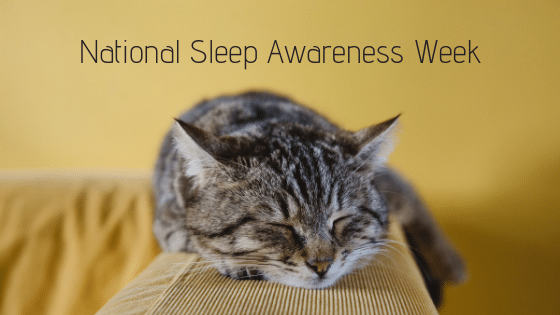Between restless kids, stressful jobs, busy schedules and poor diets, it can be difficult to get a good night’s sleep. You may think you are getting enough, but find yourself tired throughout the day. It’s National Sleep Awareness Week, and it’s the perfect time to take a closer look at how much sleep do we really need each night to make the most of our day?!
What Determines How Much Sleep We Need?
Sleep needs can vary across ages and lifestyles. Sleep impacts our immune system, our emotions, our decisions, and our ability to communicate with others. To determine how much sleep you need, it’s important to examine what lifestyle factors are affecting the quality and quantity of your sleep.
In general, the average adult needs 7 to 9 hours of sleep each night, but everyone is different and requires different amounts of sleep to function properly.
Ask yourself these questions:
- Are you less productive and more emotional if you don’t get at least 7 hours of sleep?
- Do you have any weight issues such as obesity or diabetes?
- Are you at risk of heart related diseases such as hypertension?
- Are you experiencing trouble sleeping?
- Do you depend on caffeine to get you through the day?
- Do you often feel sleepy throughout the day or while driving?
If you answered “Yes” to any of these questions, it’s time to start focusing on how to improve the quality and length of your sleep.
Related: Sleep Awareness Week: Most Americans Need Better Sleep
Tracking Your Sleep Patterns
Tracking your sleep patterns is an effective way to determine how many hours of sleep are best for your lifestyle. Here are a couple of options that can help you track your sleep!
Keep a Sleep Journal
Tracking your sleeping patterns in a notebook or diary is a great way to remember how you felt after a good night’s sleep, and how you felt when it just wasn’t enough. Make sure to note exactly how energetic and productive, or how tired and emotional you feel based on how long you slept.
The only fault to this method is that it can be difficult to get a precise calculation of exactly how much sleep you got. For example, you may not remember what time you fell asleep, how often you woke up, and how much of that was actual deep sleep.
Use a Sleep Tracker App
Let a smart watch or smart bed do the tracking for you! Smart watches have built in sensors that monitor your heart rate. They can determine exactly when you fall asleep and how often you wake up based on your heartbeats per minute. Smart beds are designed in a similar way, but have sensors that track your sleep based on your movement. Both options have apps that allow you to review this scientific data.
Whether you use an app, write a journal (or both), it’s up to you to reflect on this information and take additional steps to ensure you get the right amount of valuable sleep to have a good day ahead.
Tips for Better Sleep
If you find yourself struggling to get a good night’s sleep, here are some tips:
- Design a strict sleeping schedule and stick to it (even on the weekends).
- Create a relaxing bedtime routine, like reading in dim light or petting your dog.
- Exercise regularly!
- Ensure your bedroom has the ideal temperature, lighting and sound.
- Invest in a comfortable mattress and pillows.
- Avoid sleep inhibitors such as alcohol, caffeine and antihistamines.
- Turn off electronics before bed.
As we celebrate National Sleep Awareness Week, it may be time to reevaluate your sleeping habits and make some changes! Sleep affects almost every aspect of our lives, so make sure you are getting enough quality sleep each night.

